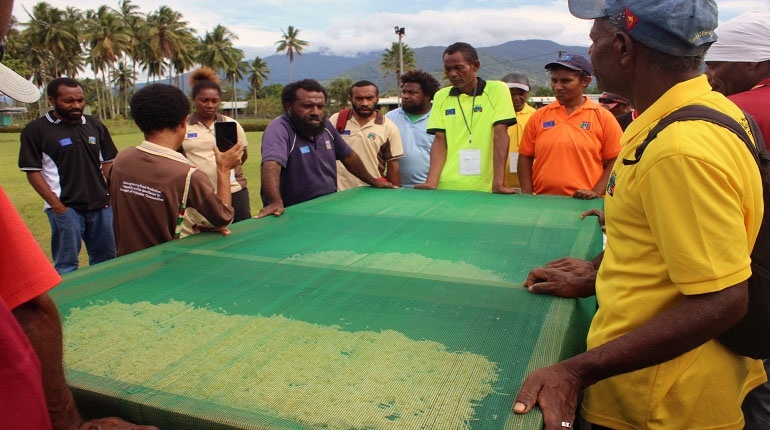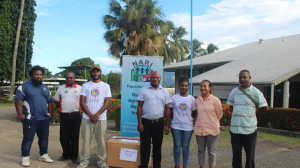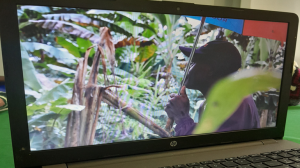Basic methods of processing common staple crops are vital. Staples such as sweetpotato, cassava, taro and banana have high moisture contents and it takes just a few days before they start to rot. Processing ensures that these crops are turned into forms that can be preserved and stored over a long period of time.
One way of doing this is to process fresh tuber or root crops into flour. In this dry, powdery form, about 87 per cent of moisture levels in raw crops is reduced. Flours made from staple crops can be stored for up to 12 months.
Over the years, the National Agricultural Research Institute (NARI) has introduced basic methods of processing of common staples into flour to enhance the levels of nutritional and socio-economic security among vulnerable farming communities, around the country. Such efforts have been undertaken since 2016 through project field days and workshops, and our annual Agricultural Innovations Show. Currently, such programmes are featured in a European Union funded action on Climate Change Resilience project to build the capacity of targeted communities to be resilient during droughts.
Information packages in the form of pamphlets and brochures basic food preservation methods such as processing of staples like sweetpotato into flour.
This process involves proper peeling, washing, grating, drying, and milling using simple tools like hand-driven mills or mortars and pestles. This helps to reduce moisture and thereby minimise rotting and other damages. What remains important is that, vulnerable communities in rural areas understand the importance of food preserving staple crops by processing them in their own households. This will cut down on costs involved in buying manufactured flour from retail outlets.
NARI recognizes the importance of this and has been delivering basic food processing training programmes to farmers through partnership with various community development organisations. Examples of such engagements include trainings conducted by World Vision in Markham Morobe province, in 2016; the Adventist Development and Relief Agency PNG in Kokoda, Oro province, in 2017; and by the Wild Life Conservation Society in Gembogl, Simbu province, in 2019. Similar work is undertaken through other a Public Investment Programme funded project known as PNG Preparedness to Cope with Climate Change induced Stresses.
More than a thousand farmers, including women, have been trained over the past four years. They now understand the importance of processing and preserving staple crops as flour and making other value added products out of it. Such skills can be easily passed from farmer-to-farmer to mitigate negative effects of climate change.
Flours made from common staple crops would be very helpful in sustaining food supplies for households between harvest seasons. They would also reduce the risks of damages and wastages caused by pests and diseases, during drought periods.
To ensure safe storage, processed root or tuber crop flours must be stored inside air tight containers to enhance their shelf life. Furthermore, processing of staple crops, would help to preserve some very nutritive elements. Sweetpotato flour contains nutrients like beta–carotene andvitamins A, C andE. So a mixture of it with wheat based flours can be used to make bread and muffins to ensure healthy diets in household. This can help to supplement vitamins needed especially during times of drought when the variety of vegetables and fruits is limited.
There is also opportunity for rural farmers to process and sell sweetpotato home made flour or baked buns and scones made out of it. Income earned from these could help families to purchase store foods to sustain them in times of stress such as the current Covid-19 pandemic lockdown.
Communities on the border of Morobe and Madang provinces have shown great interest and are beginning to take initiatives in their own communities, processing home-made sweetpotato flour. A mother from Teptep, Yamoi Mussa, said such trainings help to complement women programmes initiated by the local church to generate income their families need to afford basic goods and services, like education and health.
Processing and preservation of staples remains a crucial skill for vulnerable farming communities. We understand the need for farmers to be well informed, knowledgeable and prepared for any future disaster. They should take ownership of such skills and practice them in order to become resilient.




